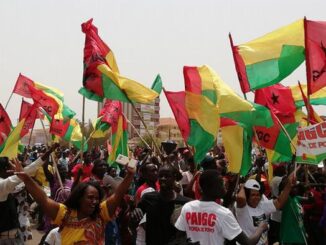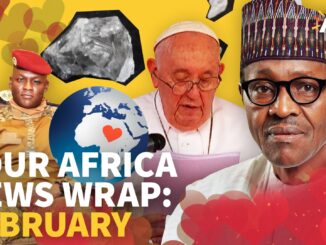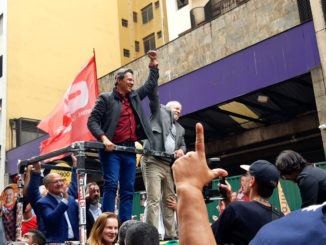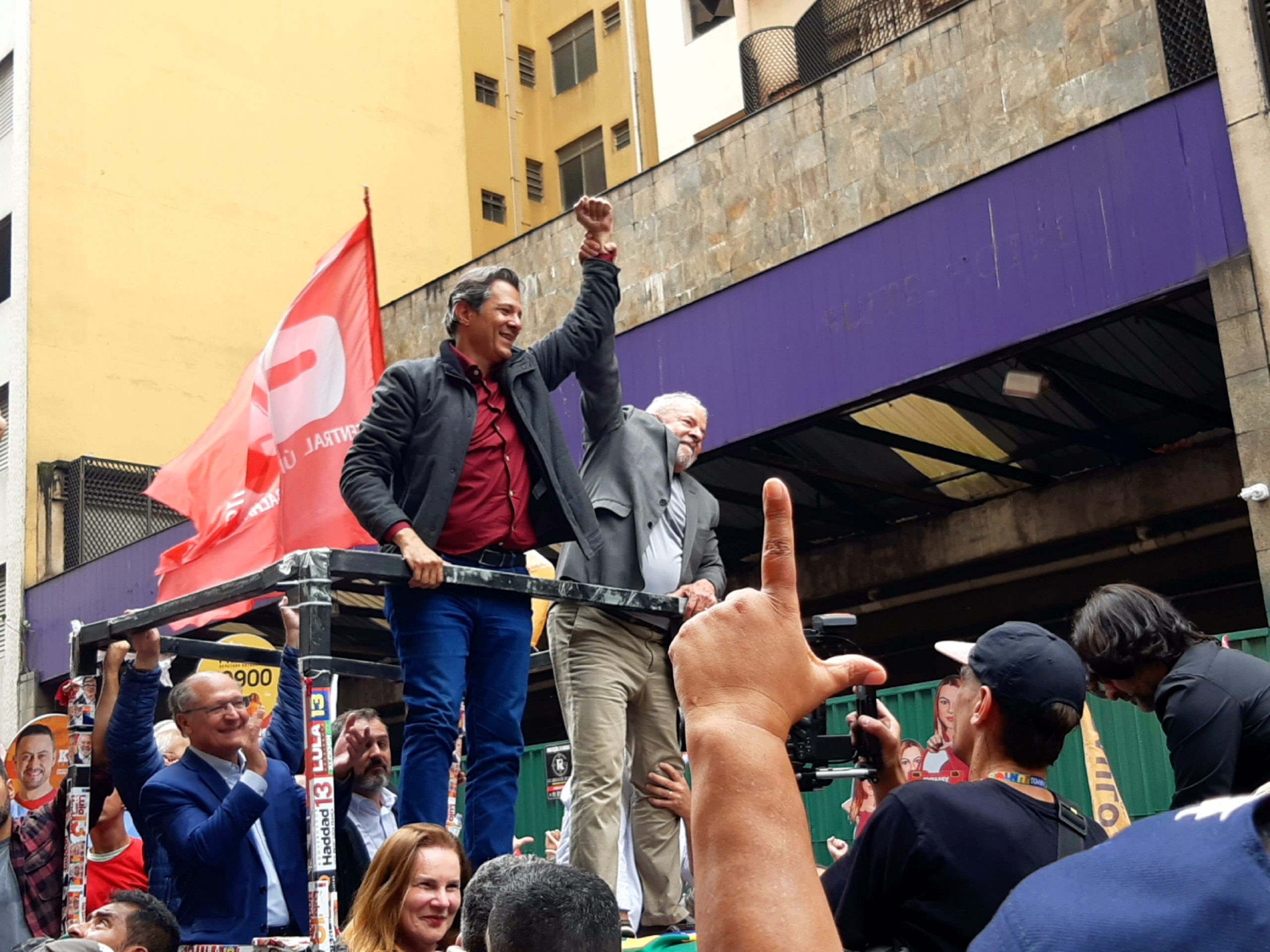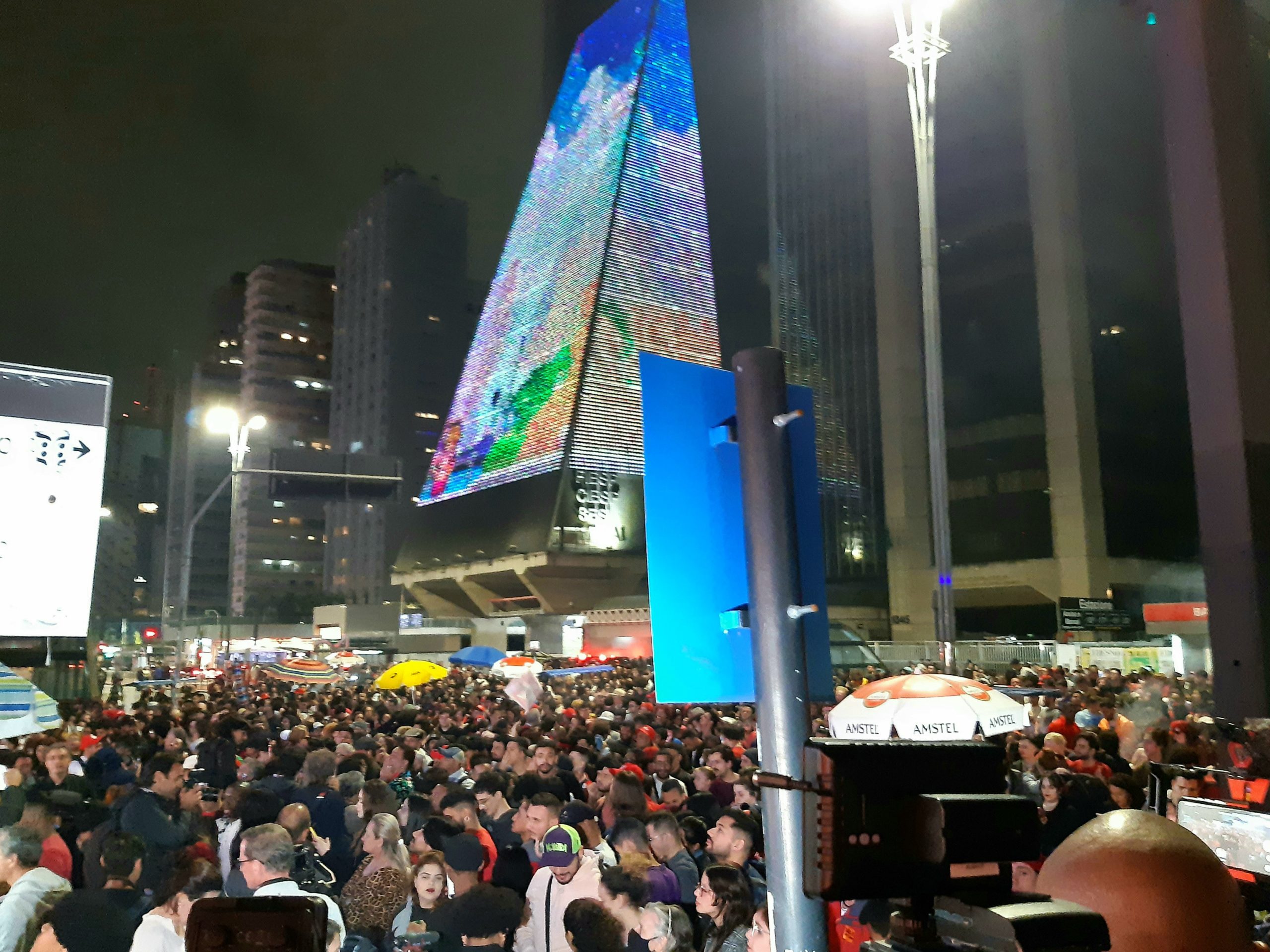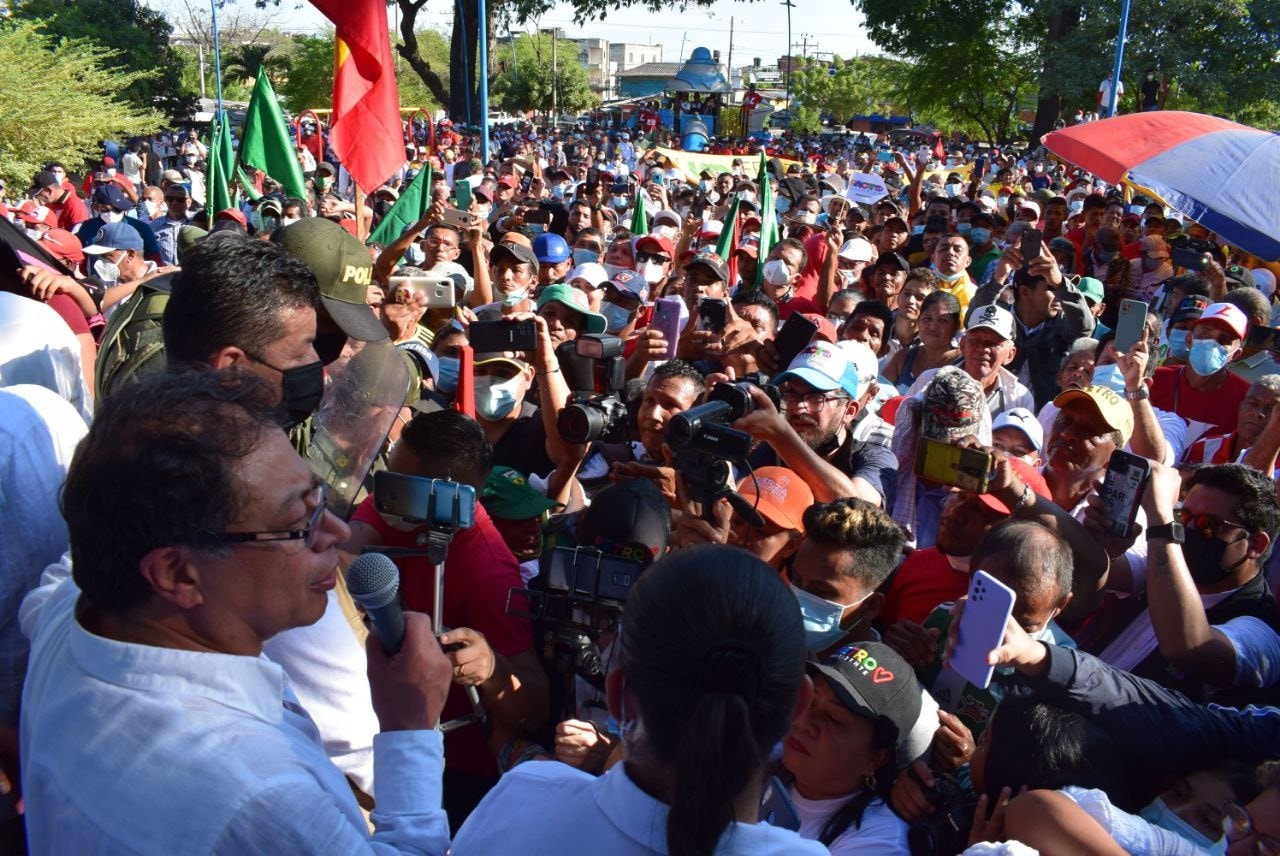
For Francia Márquez, land is life.
The 39-year-old Afro-descendant woman was raised in mountainous territories that have been occupied by generations of Africans in what is now known as Colombia. They are the offspring of people who had escaped slave masters.
“Territory is a space of life and diversity,” said Márquez, who was dressed in white from head to toe and clad in African jewelry. She addressed a standing-room only event held on February 7 at a community center that serves the Spanish-speaking population in Hyattsville, Maryland, on the border of Washington, D.C. “And now, I want to be president of Colombia.”
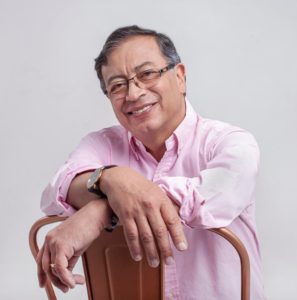
Many say the upcoming Colombian presidential election looks to be the most consequential in decades. That’s because, while some praise Márquez, everyone Toward Freedom spoke to agreed militant-turned-politician Gustavo Petro is the strongest candidate on the left. The most recent poll shows Petro as the most favored left-wing candidate, with 77 percent of the public’s favor, compared to only 12 percent for Márquez. More interesting is that Petro is the most recognized and favored candidate across the political spectrum, according to Centro Nacional de Consultario, a Colombian think tank.
“With the failure of the government of Iván Duque, the public is really looking for something different,” said Gimena Sánchez-Garzoli, Director for the Andes at the Washington Office on Latin America (WOLA). Under the right-wing Duque presidency, murders of social leaders have continued as the 2016 peace accords to demobilize guerillas remain unimplemented. “Last year’s civil strike, the effects of COVID-19 and the economics of the country have pushed people who normally wouldn’t have run.”
Márquez and Petro are seeking the nomination of Pacto Histórico, a left-wing coalition, during today’s party consultations. These primary-like events will determine who will move on to first-round runoff elections on May 29. A second round would be held on June 19 if no candidate wins at least 50 percent of the votes. While Petro seeks the coalition’s nomination as a Colombia Humana party candidate, Márquez is vying with the support of Polo Democrático Alternativo, a social democratic party.
Aside from Pacto Historico, a center-right coalition, Coalición Equipo por Colombia (Team Colombia), and a center-left coalition, Coalición Centro Esperanza (Hope Center), are deciding on candidates today as well. A few candidates, including the notable former senator and once-exile Ingrid Betancourt, have opted out of today’s consultations and will run against the coalitions on May 29, either on a party ballot or independently.
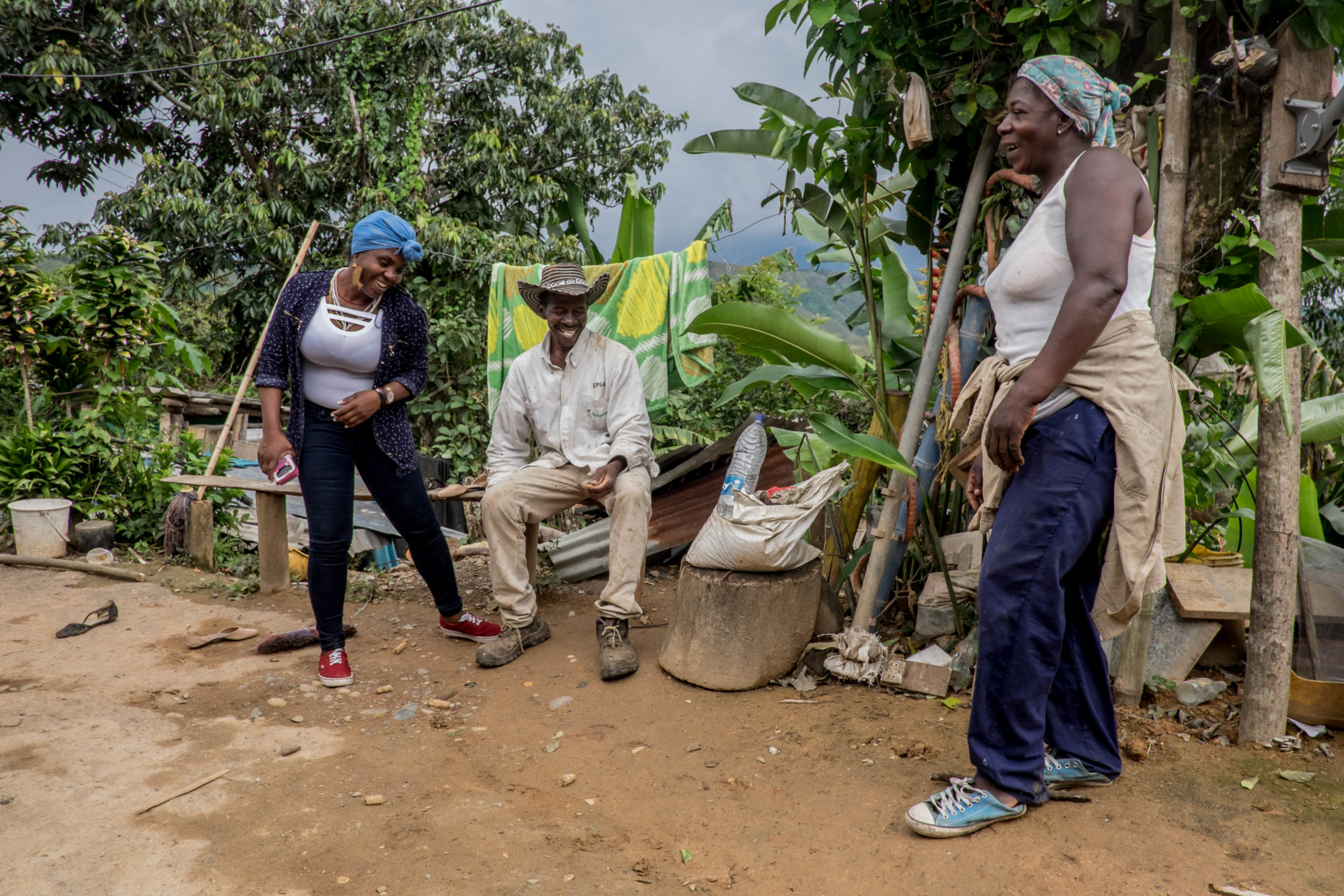
Putting Colombia in Context
Colombia is among the top 20 most violent countries in the world. That is partly because the United States has provided $4.5 billion in arms and military training via Plan Colombia, a 22-year-old anti-narcotics program implemented during the presidency of right-wing president, Álvaro Uribe (2002-10). The U.S. military also reportedly has helped build out and now occupies seven Colombian military bases.
Out of 49 million people, 8 million have been displaced since 1985, according to Human Rights Watch. That’s because of decades of struggle between coca producers and traffickers, miners, Indigenous and Afro-descendant people, and those who represent foreign interests.
Meanwhile, Colombia has the highest income inequality and labor market informality in Latin America, according to the World Bank.
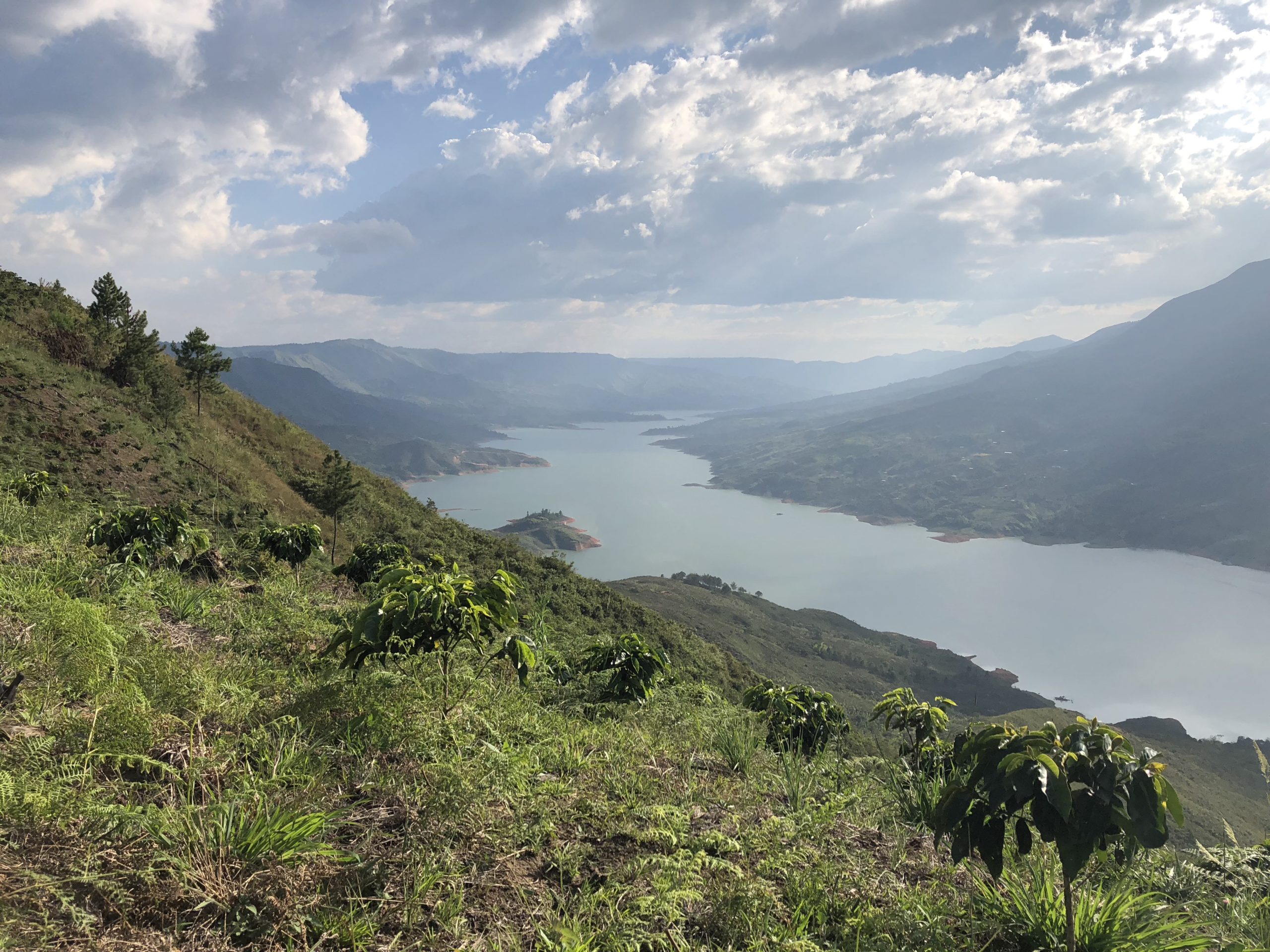
The Fear of ‘Becoming Venezuela’
Dan Kovalik got much pushback for announcing in February his support for Petro, who was roundly lambasted for recently saying in a radio interview, “We do not like [Venezuelan President Nicolas] Maduro. We have said it many times. We don’t like what is happening in Venezuela in terms of the extinction of democracy.”
Another attack came on Twitter: “I suggest Maduro stop his insults. Cowards are those who do not embrace democracy. Get Venezuela out of oil, take it to the deepest democracy. If you have to step aside, do it.”
Le sugiero a Maduro que deje sus insultos. Cobardes los que no abrazan la Democracia.
Saque a Venezuela del petroleo, llevela a la más profunda democracia, si debe dar un paso al costado, hágalo. https://t.co/kA8DBwQ3fT
— Gustavo Petro (@petrogustavo) February 12, 2022
These kind of comments have moved some to call Petro “another Boric,” alluding to Chile’s new president, Gabriel Boric, who recently criticized Venezuela and Nicaragua.
“It might be tactical,” said Kovalik, who teaches international human rights at the University of Pittsburgh School of Law. “He still represents that [guerilla]. That’s why I still like him. He’s opposed to U.S. imperialism.”
Petro has gotten backing from figures of the international left, including U.K. Labour Party leader Jeremy Corbyn. While regional leaders, including Maduro, assailed Petro on Twitter for criticizing Venezuela while it undergoes a process of socialist construction that began in 1998, some understand the rationale.
Sánchez-Garzoli has been working on Colombian issues since 1998 and has been exclusively focused on the country since 2004. She said Uribismo, the far-right ideology of Uribe that helped escalate the drug war, is to blame for the inflamed relationship with Venezuela. That has created a fear among Colombians that their country is “becoming Venezuela.”
“Colombians think of Venezuelans as their cousins,” Sánchez-Garzoli said. “There’s always been good relations, people to people—it’s just been the government that has had this antagonistic approach.”
Ajamu Baraka is a human rights activist who co-founded a grassroots organization called the Black Alliance for Peace. He has lived in Calí, a predominately Afro-Colombian city, since 2011, and regularly advises movement and elected leaders in the country. “This spat between him and some figures like Maduro, while it is politically unwinding in terms of regional politics, plays a certain role in Colombian politics.”
Baraka said it is unclear if real ideological differences exist between Petro and Maduro, or if Petro’s statement was a critique from the left, or if it was Petro’s way of creating space between him and Maduro. “It’s understandable, but also opportunistic,” Baraka said.
Sánchez-Garzoli said part of the reason Petro lost the 2018 presidential election was because he wasn’t able to attract more moderate elements of the population to vote for him because of the public’s aversion to anything related to Venezuela.
Baraka said the question is similarly complicated among Afro-Colombians. “Part of it is confusion,” he said. “Part of it is the relative conservatism that’s across the region, unfortunately.”
When a candidate is considered in favor of Venezuela, that reinforces the right wing and the moderates because they fear a public seizure of companies as well as persecution of political and economic elites, Sánchez-Garzoli said. She added the center and the right recently have come together. “They are making alliances [with groups] they’ve never worked with before,” Sánchez-Garzoli said. “It’s very hard to know what that will mean in practice.”
In a region where the left has successfully taken state power, many said it is important for Petro to win to create more stability for the Western Hemisphere’s left pole, which includes Bolivia, Chile, Cuba, Honduras, Nicaragua and Perú. “They’re not going to go away quietly,” Kovalik said of Colombia’s ultra-right wing.
James Early, a board member of Washington-based think tank Institute for Policy Studies, also sees potential in a Petro presidency. “Getting rid of this ultra-right Duque government and whoever would become the steward of state power is really the bottom line. This is where the rub comes.”
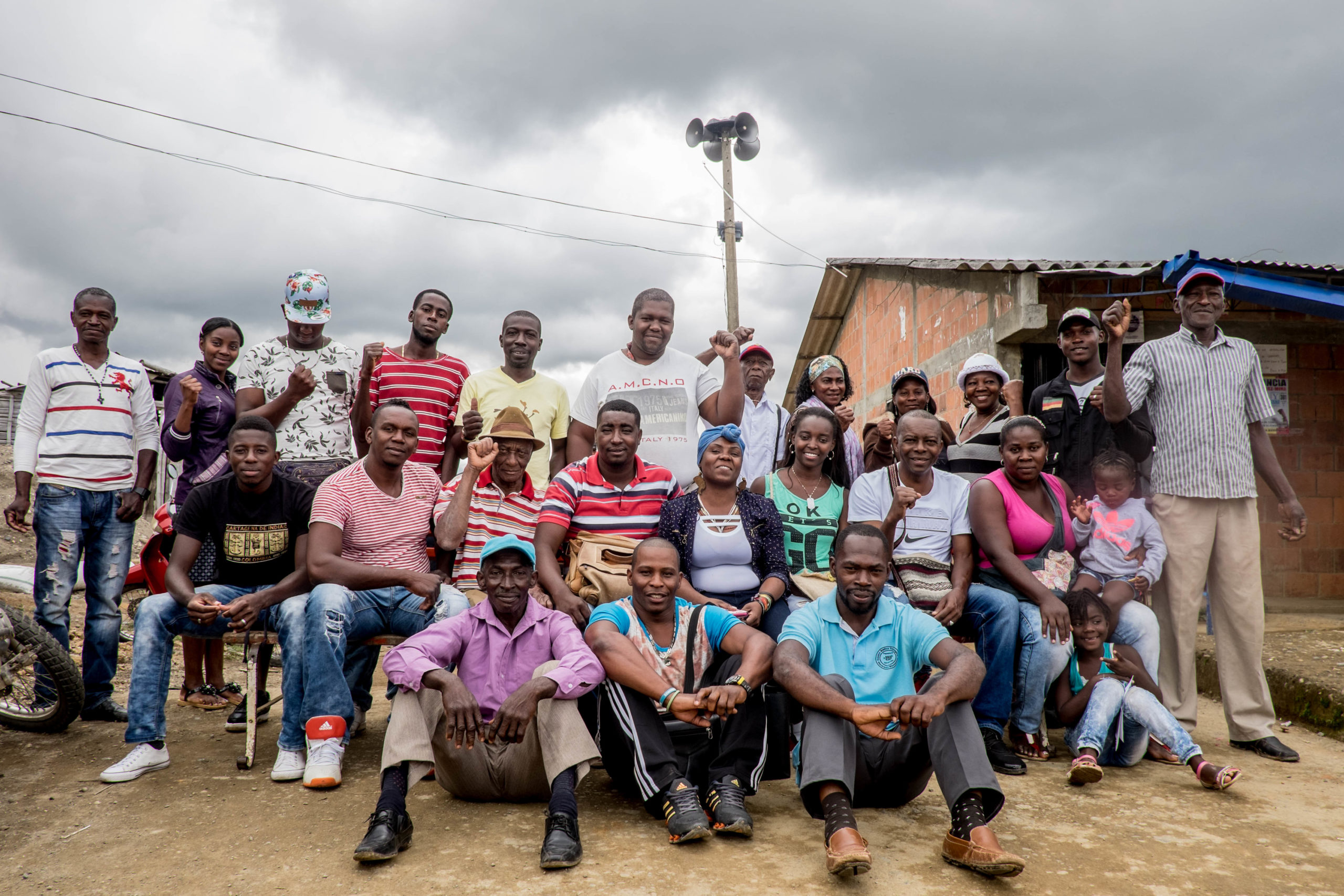
The Afro-Descendant Question
Charo Mina Rojas, an Afro-Colombian who supports Márquez’s candidacy, believes it would be a boon if Petro wins the presidency. But that support comes with reservations.
“Gustavo Petro continues to be part of that white supremacist voice that does not recognize diversity and the political power that diversity can have in this country, particularly from marginalized ethnic groups,” said Mina, who is a member of the Proceso de Comunidades Negras, or Black Communities Process, which represents more than 100 Afro-descendant community councils and organizations spread across 4 departments, or states. “Colombia always performs as a Mestizo country, but it’s white people governing.”
Unfortunately, Petro’s campaign did not respond as of press time to Toward Freedom’s inquiry.
Sánchez-Garzoli noted Petro has been known for a more top-down approach, keeping decision making to a tiny circle of advisors.
That is unlike the Afro-descendant tradition, in which every aspect of life is collectivized, attracting many to Márquez’s candidacy.
“She’s fearless—she’s a leader,” said Victor Hugo Moreno Mina, an Afro-descendant who is running for a seat in Colombia’s congress under the Green Party banner. “She has been defending Black communities in the cities, but also in the rural areas.”
Moreno is the Consejo Mayor, or president and legal representative, of the Asociación de Consejos Communitarios del Norte del Cauca (ACONC, or the Association of Community Councils of Northern Cauca). ACONC represents 210 rural communities and 10 municipalities in Cauca department.
Moreno was with Márquez on May 4, 2019, when armed assailants shot at their group as they were preparing for discussions with the government on what they see as negligence. “She defends people who don’t have their basic needs [met] in our communities.”
For Afro-descendants, their ancestral territories dating back to the 17th century have been equated with life itself. They descend from Africans who were kidnapped from the same villages in Africa and sold together, which meant they could communicate in their native languages to outsmart the slave masters. After escaping into the mountainous jungles of Colombia, they established the first African settlements. Their descendants had been able to continue the traditions of their homeland in relative isolation until the drug war in the early 2000s that began mass displacement. Then an influx of mining companies continued the violence in the 2010s.
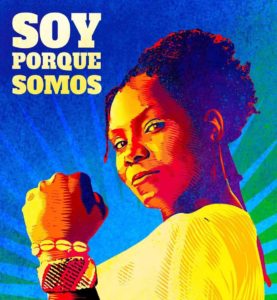
Ubuntu, a term with roots in the Bantu languages of central and southern Africa, means “I am because you are and you are because I am.” That is reflected in Márquez’s campaign slogan, “Soy Porque Somos,” or “I am because we are.” Marquez helped organize rural Afro-descendant women in her hometown of La Toma, located in the Cauca department, against foreign mining companies. Eighty women walked 350 miles in 10 days in November 2014 to the capital, Bogotá. That, as well as a 22-day protest in Bogotá, moved the government to end illegal mining activities and convene a national task force. But before that had taken place, the death threats had become too much to bear. On April 5, 2014, she was forced into exile with her two children, landing in the city of Calí. Her efforts caught international attention, winning her the Goldman Environmental Prize in 2018.
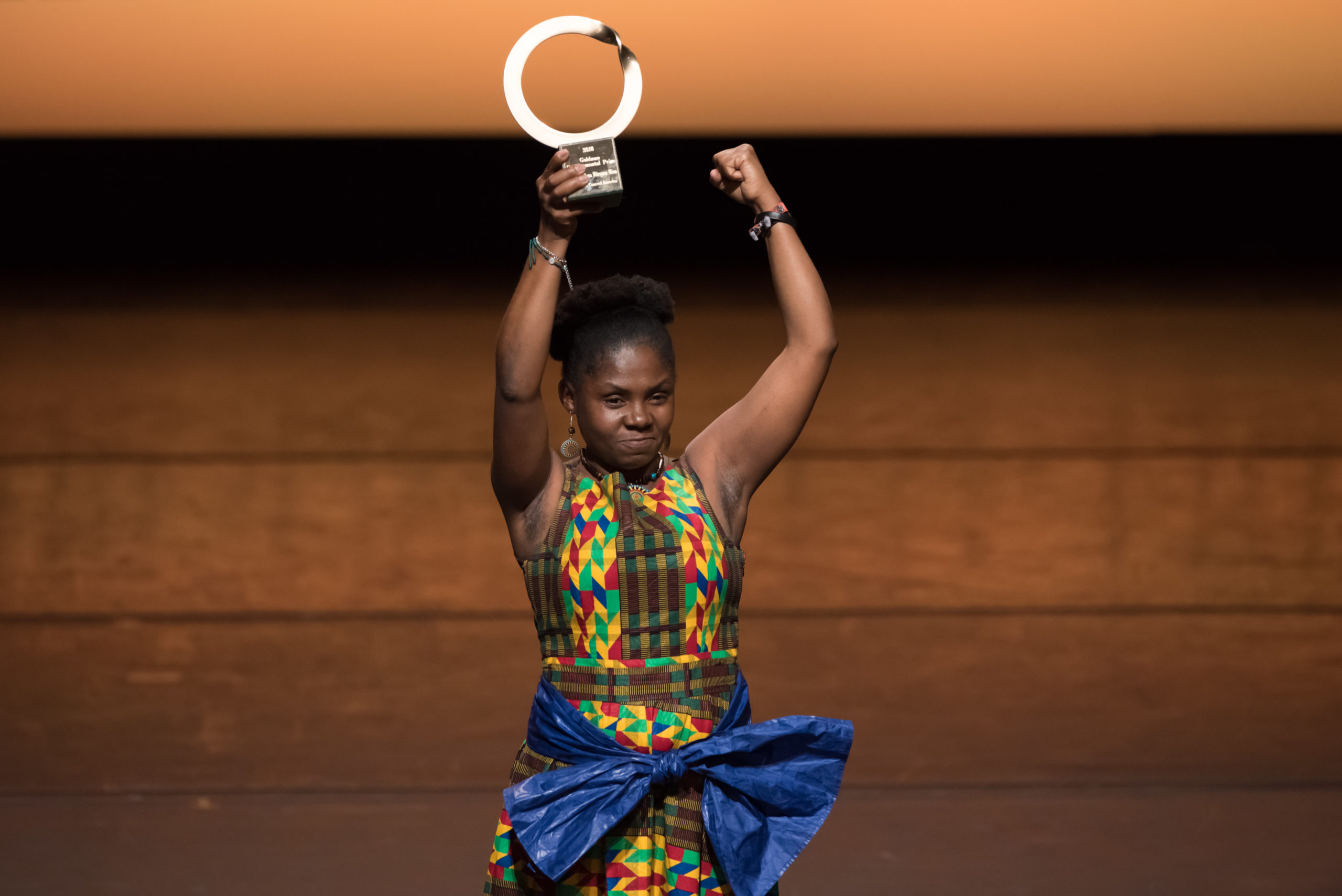
The collectivism of the Afro-descendant community filters into Márquez’s approach to campaigning for president.
“I don’t have anything to offer. We have to change the logic,” Márquez told a crowd of mainly Spanish-speaking people on February 7 in Maryland. “That’s why we have a mandate.”
Instead of running on a platform, she brings to the public the demands of the Afro-descendant and Indigenous communities, which includes distributing land to women, a focus on education, the legalization of drugs, an end to obligatory military service, the right to abortion and an end to the country’s 60-year-old civil war.
“She is contesting these structures from a very clear Black feminist perspective,” Mina said.
A Black woman at the event stood up wearing a Daishiki, a West African blouse-like patterned garment. “You have not let those evil forces touch you,” she told Márquez.
“To see you gives me hope,” said Pedro, an Indigenous Colombian who wound up in the Washington area after fleeing the violence.
“She defends everything with her body and soul,” Moreno told Toward Freedom.
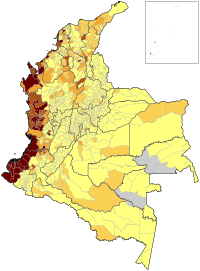
‘Tricky Ethical Situation’
Mina said Márquez’s candidacy represents a grassroots process. And the people are patient.
“Nothing is going to change in a four-year period,” Mina said. “But in a long-standing process, we can expect a successful political alternative.”
Petro will need help to not only broaden his base, but to keep his current base excited. That’s where Márquez, who is unlikely to win today, can play a role.
“Francia has really forced the debate on different issues,” Sánchez-Garzoli said.
The 1991 reformed constitution includes a declaration that Colombia is a plurinational state. Unfortunately, that has not played out in giving Afro-descendants and Indigenous Colombians full reign over their lives. That contradiction again has come to a head with the ethnic chapter of the 2016 peace accords not being acted upon, according to a 192-page report Instancia Especial de Alto Nivel con Pueblos Étnicos (IEANPE, or Special High-Level Body with Ethnic Peoples) issued in December. Non-governmental organization Instituto de Estudios para el Desarrollo y la Paz (INDEPAZ, Institute for Development and Peace Studies) reported murders of social leaders, which includes activists, politicians and journalists, surged to 1,270 between 2016 and 2021. Although forced displacements hit their peak in the early 2000s, as seen in the INDEPAZ chart below, about 100,000 or more people have been displaced every year since the peace accords were signed.
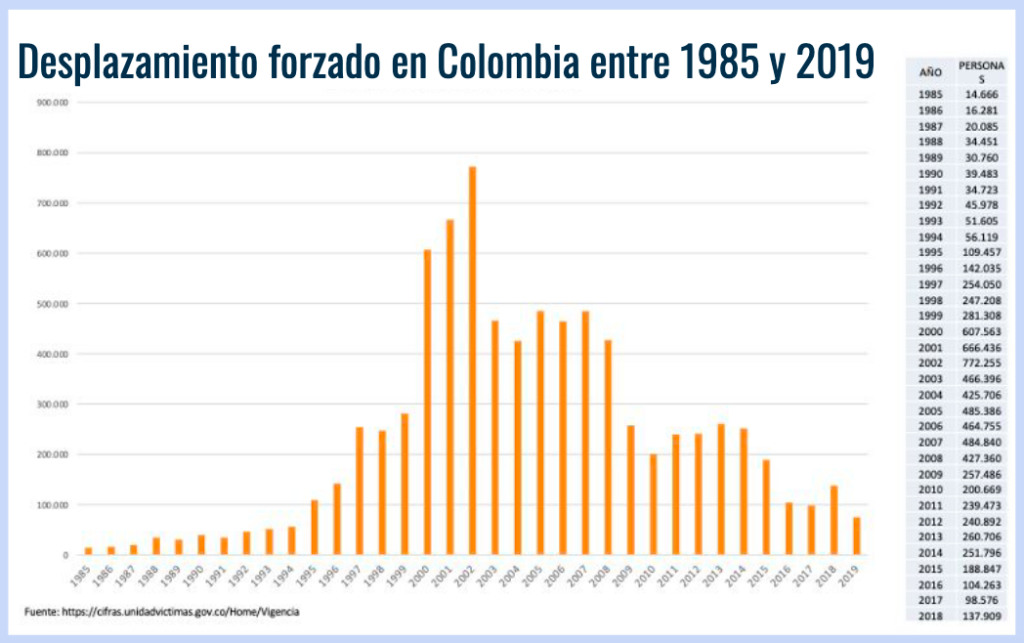
“The citizen backing is going to have to be significantly organized to broker deals with whoever emerges,” said Early, who, as part of a delegation, met with militants in Cuba as the peace accords were being hammered out. He said, as the only Afro-descendant at the meeting, he advocated for the safety of Afro-Colombians. “That is the principal question inside Colombia: How will the candidacy of Francia negotiate with the forces who are gathered around Petro?”
Mina takes a more realistic, or perhaps pessimistic, view.
“I don’t think they can change the relationships as they are,” she said. “You need a lot of economic power to do that.”
Mina added Petro has been trying to gain alliances with those in power. She and others saw that as a tough road to walk. More right-wing elements like the Catholic Church may require compromises that can go against a candidate’s positions.
“That is a tricky ethical situation,” Mina told Toward Freedom on a phone call from her Calí home. “If that was just words, that is okay. But that is not just words. When he wins, all those people will come back to cash the check.”
Kovalik said the international left, much of which has not seized state power, should support Petro’s candidacy.
“Even if he’s not openly supporting Cuba, Venezuela or Nicaragua, he’s not a lackey of the military in Colombia,” he said. “It will be a huge step forward for Latin America to have a president of Colombia who’s not willing to allow Colombia to be a giant military base for the United States.”
Julie Varughese is editor of Toward Freedom.

